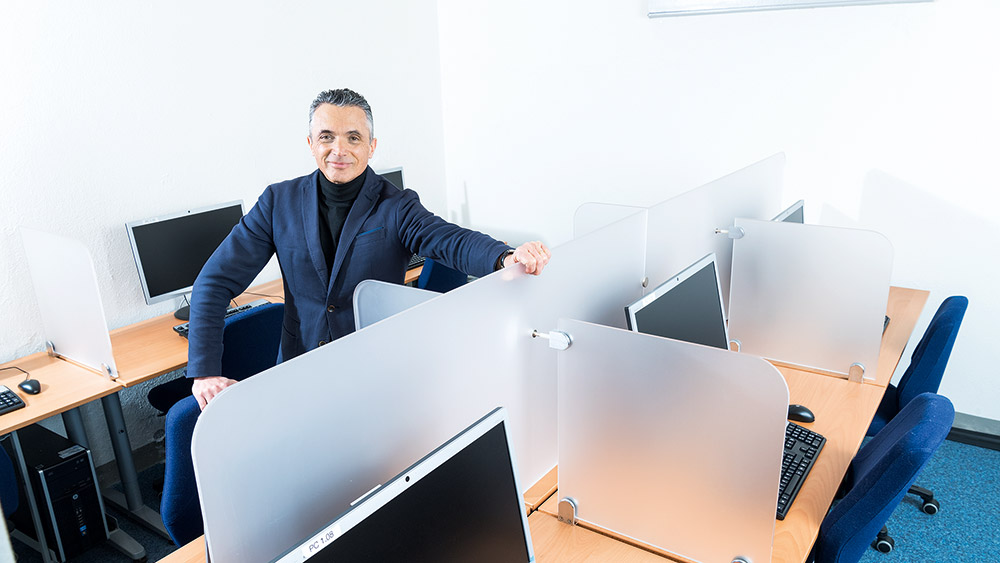Navigation auf uzh.ch
Navigation auf uzh.ch

MARC CHESNEY: There are two types of wealth: One refers to possession of material goods – money, real estate, cars – while the other has to do with the non-material, moral and intellectual values that we acquire. The latter are far more important in my opinion. But “having” is often confused with “being”.
CHESNEY: We need material goods, that’s clear. Everybody needs an apartment, for example – but not dozens of apartments. Economics, however, often teaches us that “more” equals “better”. This may be true in a way if you’re very poor. But if you already have a good life and still want more and more, I believe this view is questionable – greed is dangerous, because it puts “having” above “being”.
CHESNEY: Because constant growth isn’t a realistic goal. We have to ask ourselves, as a society, whether permanent growth is a feasible and desirable objective. It’s definitely not a law of nature, although it’s sometimes treated as such in business and economics. Pursuit of economic growth is merely based on questionable assumptions, which too often aren’t really challenged. As elsewhere, a “business as usual” approach isn’t appropriate in economics. Rather, we should start to think outside the box, and possibly even establish a new school of thought. Financial instability and anthropogenic climate change are current issues that require new solutions.
CHESNEY: Let’s take the last financial crisis: It was caused by dubious, complex financial products and an enormous mountain of debt. Our current economic system is based on the twin poles of debt and growth. Following this logic, debt is useful to promote growth, and growth is needed to repay part of the debt. It’s a vicious circle that doesn’t really work. Growth isn’t always possible, nor is it always desirable. This is why we need new paradigms – new mindsets that do away with the current one. And this is where we as scholars and academic teachers must also do our part.
CHESNEY: If you compare the finance and economics curricula of universities internationally before and after the crisis, you’ll note that the topics haven’t changed significantly. They don’t adequately reflect the 2008 financial crisis, and I sometimes wonder whether it happened at all – it’s embarrassing. We should design lectures and study programs that analyze the challenges we’re facing and deal with them with the required seriousness.
CHESNEY: First and foremost, I can challenge the key concepts in the field of business and economics to examine which ones still make sense and which have become obsolete – for example, the fact that “more” is always presented as synonymous with “better”. This idea should be challenged. And we must ask ourselves whether money is a means or an end. Unlike physics, for example, economics doesn’t have any fundamental laws that apply at all times and in all places.
CHESNEY: Growth not only requires an unsustainable accumulation of debt, but is also underpinned by planned obsolescence. In other words, goods are designed with a limited useful life. It’s good for business, but also harmful to the environment. This is why we need to change our mindset. We have to develop and buy products that are sustainable. Banks, too, should make sustainable investments. There are still too many that invest in fossil fuels far too heavily.
CHESNEY: Not to the extent needed. I’m not saying everything’s going wrong. But the major banks are still far away from what they should to be doing – that is, adhering to the climate goals Switzerland committed to in the Paris climate deal of 2015, which aims to keep global temperature rise below two degrees this century.
CHESNEY: We need clients, shareholders, students, professors, journalists, and ultimately responsible citizens to keep a close eye on banks and challenge them. If Swiss financial institutions, including the Swiss National Bank, were to commit to stop investing in oil, that would send a strong signal. It would also be beneficial to their reputation. In terms of politics, these types of demands should be seen as neither left nor right, as climate change affects all of us. Our current pursuit of economic growth comes at the expense of future generations, and that's just selfish. That’s why we should forget about the “more” and focus instead on what’s “enough” or “necessary” to lead a decent and dignified life.